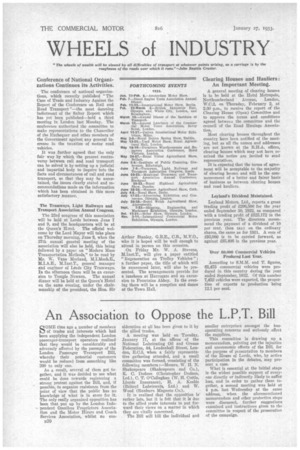An Association to Oppose the L.P.T. Bill
Page 34

If you've noticed an error in this article please click here to report it so we can fix it.
SOME time ago a number of members of trades and interests which had been supplying the independent London passenger-transport operators realized that they would be considerably and adversely affected by the passage of the London Passenger Transport Bill, whereby their potential customers would be reduced from something like 200 to only one.
As a result, several of them got together, and it was decided to see what could be done towards registering a strong protest against the Bill, and, if possible, to organize resistance from the point of view that the public has no knowledge of -what is in store for it. The only really organized opposition has been that put up by the London Independent Omnibus Proprietors Association and the Motor Hirers and Coach Services Association, whilst no con
1320 sideration at all has been given to it by the allied trades.
A meeting was held on Tuesday, January 17, at the offices of the National Lubricating Oil and Grease Federation, 84, Leadenhall Street, London, E.0,3, when a fairly representative gathering attended, and a small committee was formed, consisting of the following members :—Messrs. W. H. N. Shakespeare (Shakespeare and Co.), K. C. Dodson (Christopher Dodson, Ltd.), C. T. O'Callaghan (W. H. Cottle, Lloyds Insurance), H. A. Keeble (Britoyl Lubricants, Ltd.) and W. Wood (Ranburn Magneto Co.).
It is realized that the opposition is' rather late, but it is felt that it is due to the allied trade interests to put forward their views on a matter in which they are vitally concerned.
The Bill will kill the individual and smaller enterprises amongst the busoperating concerns and seriously affect the suppliers.
This committee is drawing up a memorandum, pointing out the injustice and uneconomic effects of the Bill, for the purpose of presentation to members of the House of Lords, who, by active participation in the debates, may present a case.
What is essential at the initial stage is the widest possible support of everyone directly or indirectly likely to suffer loss, and in order to gather these together, a second meeting was held at 4 p.m. last Wednesday at the same address, when the aforementioned memorandum and other protective steps were discussed, further suggestions examined and instructions given to the committee in respect of the prosecution of the campaign.




























































































